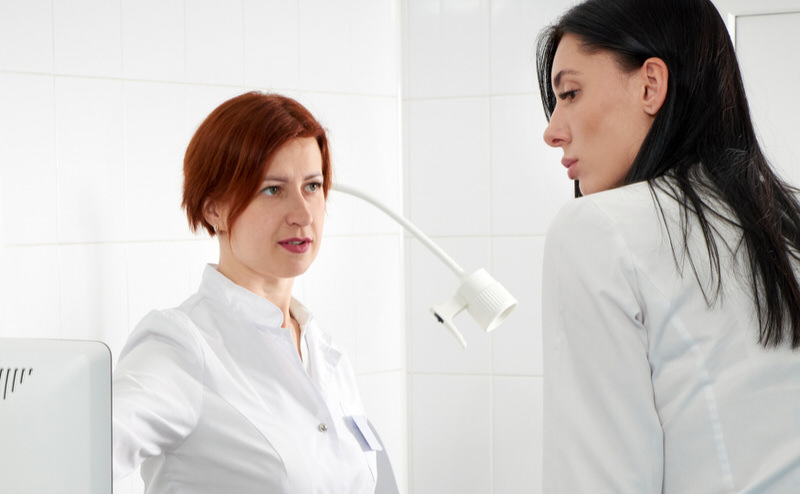There isn’t any evidence supporting that eating certain foods, doing specific exercises, taking any homeopathic medicines, or doing any rituals will make your subchorionic hemorrhage disappear.
Most subchorionic hemorrhage tends to resolve on their own, but worst-case scenarios do include the case of miscarriage. But, in most cases, your doctor will ask you to continue your daily routine without exerting yourself and come in for regular check-ups.
Bleeding during pregnancy is always alarming because we aren’t supposed to bleed, right? We might have heard bleeding during pregnancy means having a miscarriage; I mean, that’s what we’ve seen on TV most of the time.
But that isn’t the case. About 25% of pregnant women experience some bleeding or spotting. Occasional spotting is considered normal, and even vaginal bleeding, too, is deemed to be normal to an extent during pregnancy. Having said that, you should always immediately call your doctor if you do spot some bleeding. An ultrasound will only help determine the cause of your bleeding and treat it.
What is subchorionic hemorrhage?
A subchorionic hemorrhage or bleed, also known as a subchorionic hematoma, means blood is accumulated between the uterine lining and the chorion (the outer fetal membrane present next to the uterus) or under the placenta itself.
The subchorionic hematoma can cause light to heavy bleeding, but sometimes you don’t even bleed even if the hematoma is diagnosed.
According to a study, in the case of 64,000 pregnancies, 1.7% of pregnant women experienced a subchorionic hemorrhage. Most of these cases may resolve independently, and women go on with a healthy pregnancy.
Subchorionic bleeding is more common in women who have gotten pregnant through IVF and is also a common cause of first trimester bleeding and often gets resolved on its own.
But any case of bleeding during pregnancy will be monitored by your doctor to be on the safer side.
How is subchorionic hemorrhage different from spotting?

Although subchorionic hemorrhage is one of the causes of bleeding during pregnancy, many women might mistake it for regular spotting.
Spotting occurs in more women than a subchorionic hemorrhage during the first trimester.
Spotting means a few spots of blood that you see on your underwear. While it’s different from vaginal bleeding, it’s always best if you report the bleeding to your doctor immediately.
Causes of spotting during pregnancy
- Uterine expansion
- Increase in hormone level
- Implantation
- Vaginal exams
- Intercourse
- Cervical changes
Keep in mind that bleeding that goes beyond a few spots and requires a pantyliner is often a sign of vaginal bleeding, and you should call your OB/GYN immediately.
What are the symptoms of subchorionic hemorrhage?
The only symptom of subchorionic hemorrhage is bleeding. It may look like spotting, or you may need a pad to control the bleeding. Pregnant women with subchorionic hemorrhage can experience heavy bleeding with clots to light bleeding to no bleeding at all.
Some women might not even know and might not even experience any symptoms of subchorionic hematoma till their next routine ultrasound exam.
What are the causes of subchorionic hemorrhage?
Since the first case of subchorionic hemorrhage was identified 40 years ago, it’s still unclear why women experience subchorionic bleeding during pregnancy.
But, research suggests that women with conditions like blood pressure disorders, or preeclampsia, or trauma could play a role in the cause of subchorionic hemorrhage.
What are the potential risks of having subchorionic hemorrhage in pregnancy?
Subchorionic bleeding is not known to cause any complications in most cases. In addition, hematomas found in the first trimester pose less risk than those found in later stages of pregnancy.
But studies suggested that in worst-case scenarios, a pregnant woman with a subchorionic hemorrhage may either experience a pregnancy loss or give birth prematurely.
But further studies also saw that a subchorionic hemorrhage doesn’t put pregnant women at higher risk of miscarriage.
Another possible complication found is placental abruption. Placental abruptions happen when the placenta detaches itself from the uterus lining.
Are there any treatments for subchorionic hemorrhage?
Most subchorionic hematomas resolve on their own within a few weeks, and there is no definite course of treatment or cure invented yet.
There is no evidence found that eating certain types of food, exercising, doing any yoga, or eating any homeopathic medicines will help resolve it.
Please do not believe or fall for any marketing schemes you find online to make the bleeding disappear. You can continue with your daily routine and go in for regular check-ups to see the blood clot status.
In most cases, your doctor would recommend you not exert yourself, take rest, eat healthy foods, drink plenty of water, and avoid intercourse.
I have seen women talking about drinking cranberry juice or eating salmon will help resolve the bleeding, but no study or science is backing this. Focus on eating balanced, nutritious food because this will help your baby grow and prevent you from gaining too much weight during pregnancy.
What are the other causes of bleeding during pregnancy?
- Ectopic pregnancy
- Miscarriage
- Implantation bleeding
- Molar pregnancy
- Cervical infection
- Incompetent cervix
- Placental abruption
- Placenta previa
- Preterm labor
- Uterine rupture
FAQs
How is subchorionic hemorrhage diagnosed?
When a woman bleeds during her pregnancy, the doctor performs a physical examination, or an ultrasound, to know the cause of the bleeding. If a person is experiencing a subchorionic hemorrhage, the area where the blood is accumulated inside the uterus will show up on the screen as ‘black space.’
Subchorionic hemorrhage can also be diagnosed without the woman experiencing any bleeding, but it might appear during the routine ultrasound exam.
Will subchorionic hemorrhage harm my baby?
Pregnant women with subchorionic hemorrhage are at risk of threatened abortion in the first 20 weeks of gestation, but it doesn’t affect most ongoing pregnancies.
How long do subchorionic hematomas last?
Most subchorionic hematomas are known to be resolved within 1-2 weeks. A pregnant woman may have more than 1 subchorionic bleeding, so it’s best to consult your doctor if you spot any bleeding.
Takeaway
Even if I tell you not to be scared or be worried, you will be concerned because any bleeding during our pregnancy will disturb us.
But know that unless your doctor doesn’t tell you any severe complications, try avoiding overthinking as anxiety during pregnancy may become an onset of other complications.
Rest well, eat healthy food, drink plenty of water, and trust your doctor. If you don’t feel like something is right, get a second opinion to see if you do have subchorionic hemorrhage.


